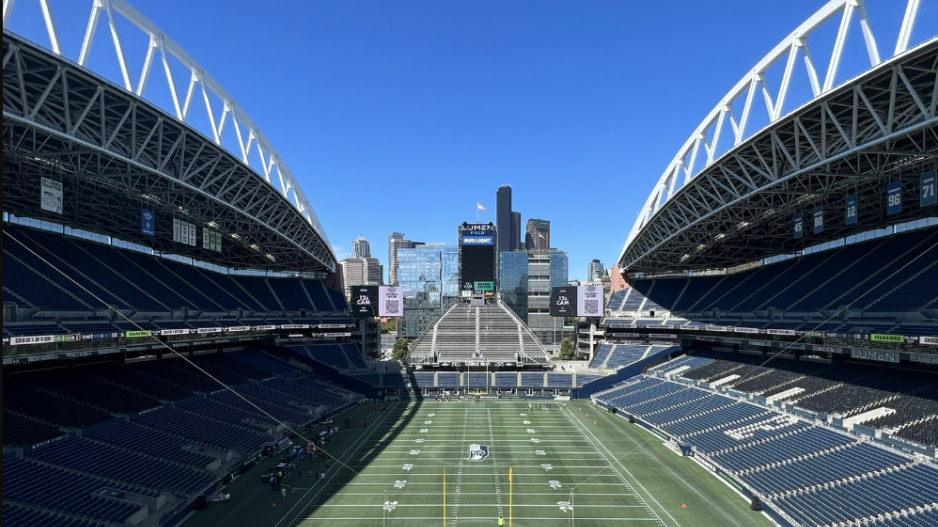With less than three years to go, is Seattle better organized for FIFA World Cup 2026 or simply more transparent than Vancouver?
Seattle Sounders chief operating officer Maya Mendoza-Exstrom, who co-chairs the city’s local organizing committee (LOC), appeared Thursday before Seattle city councillors.
After her presentation, the committee on governance, native communities and tribal governments recommended the full council delegate responsibilities to the LOC at its next meeting on Tuesday.
No similar presentation has occurred at an open Vancouver city council meeting since FIFA chose Vancouver to be among the 16 host cities in June 2022. Vancouver city hall and the B.C. government have refused to release the host city contract with FIFA and the detailed business plan on how they plan to spend more than $230 million.
Mendoza-Exstrom said Seattle could host as few as three and as many as eight matches, but is expecting between four and six games at the 67,000-person-capacity Lumen Field. Upwards of 750,000 unique visitors, between 50 per cent and 70 per cent of them international, will need places to stay. Some of them will be commuting long distances.
“We really do expect 100 per cent of hotel nights, border-to-border, I mean it is going to take everything on that transportation corridor, I-5, on our rail system, using our extended regional network to access the hotels between Bellingham and Portland and then east along I-90, as well,” Mendoza-Exstrom said.
Husky Soccer Stadium, Seattle University and Starfire Sports Complex in Tukwila are candidates for team training sites. The Sounders’ new facility at Longacres is likely to be a team base camp, Mendoza-Exstrom said.
“Right now, FIFA is exploring directly additional potential team base camps in Bellingham and Spokane and Portland that would further connect us geographically to the wider region,” Mendoza-Exstrom said.
Pier 62 on the Seattle waterfront will be the main Fan Fest site, but other venues are under consideration, including the Seattle Mariners’ T-Mobile Park, Seattle Center, Westlake Park and Occidental Park.
FIFA’s largest-ever tournament will feature 48 nations and a total 104 matches. Host nations Canada, U.S. and Mexico qualify automatically. Mendoza-Exstrom said the expansion from 32 to 48 teams gives Asian nations, especially South Korea, Japan, China and India, a better opportunity to qualify.
Vancouver, Seattle, San Francisco and Los Angeles “will function together, not only as a time zone, but as a quadrant in terms of how this tournament plays out,” she said.
The LOC signed its first supporter agreement with the Puyallup Tribe of Indians, which Mendoza-Exstrom called “the first time in history that Indigenous people have ever been a sponsor/supporter of a World Cup.”
Former Seattle police chief John Diaz is the LOC’s director of security.
The report to the committee, however, did not include budgeting.
Before FIFA expanded the number of matches from 80 to 104, five matches were expected to come to 54,500-person-capacity BC Place Stadium.
The few documents released under freedom of information about FIFA 26 in Vancouver show that the new $103.7 million PNE Amphitheatre is expected to host the Fan Fest shortly after it opens. The Canadian Soccer Association has studied the Concord Pacific land across from BC Place for another fan zone.
Vancouver Park Board pitches at Empire Fields, Jericho, Killarney and Strathcona are official candidates for team training sites. Three-to-four downtown Vancouver hotels will be needed for team accommodations. Streets around BC Place will be closed on each match day and the day before each match day.
The B.C. government announced in June 2022 that B.C. taxpayers could expect a bill of $240 million to $260 million to subsidize FIFA. But, in January of this year, the province said the city is now responsible for $230 million in costs. To help raise money for the tournament, the provincial government gave Vancouver special power to levy a 2.5-per-cent accommodation tax through 2030.
The province has not elaborated on cost estimates for BC Place, such as installation of a temporary natural grass pitch and interior renovations to transform part of the B.C. Sports Hall of Fame into additional luxury suites.
Vancouver was not included in the winning three-country bid in 2018 after Premier John Horgan balked at giving FIFA a blank cheque and bidders refused to negotiate more favourable terms to B.C.
Horgan changed his mind in 2021 when Montreal withdrew due to its concern over high costs.
FIFA reported record gross revenue of US$7.6 billion for the 2019 to 2022 cycle and forecast US$11 billion for the 2023 to 2026 period. It relies on local markets to pay most of the costs for hosting the World Cup.




